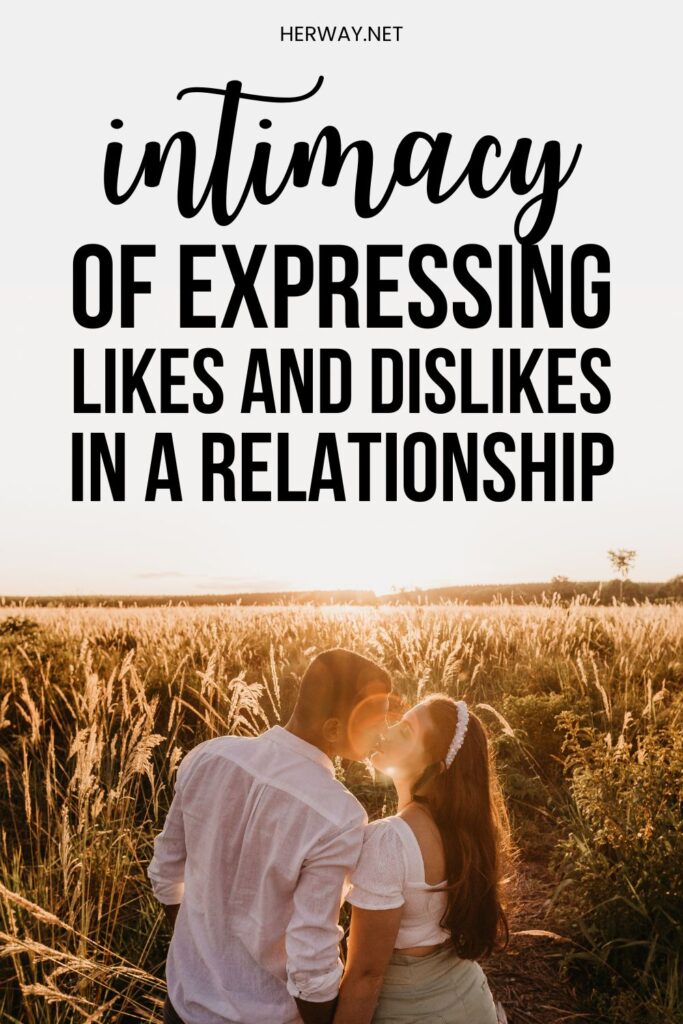Compromise is one of the fundamentals of healthy long-term relationships. It shows willingness to find a common ground and accommodate your partner’s needs, wants and preferences in a way that keeps both of you happy.
It sounds like this would be easy enough, but it isn’t. People often continue to do things that bother their partners for one simple reason: they don’t know how their significant other feels about their actions. They keep doing something that their partner dislikes because they‘re unaware that their behavior might be a problem.
Unless you let your partner know about your likes and dislikes in a relationship, they can’t know how the things they do affect you. This issue is caused by a lack of communication, which is the other pillar of happy relationships. When partners don’t tell each other things, resentments accumulate until they cause even bigger problems.
Keep reading to find out what kind of likes and dislikes have an impact on a relationship, and how discussing them with your partner can bring you closer.
Expressing Likes And Dislikes In A Relationship
Identifying your preferences depends a great deal on how aware you are of your values, needs and boundaries. You can invest some time into thinking about what you like, but the easiest way of knowing how you feel about something is taking notice as it comes up.
You don’t have to enter a new relationship with a list of likes and dislikes – paying attention to your partner’s actions and speaking up immediately will suffice. Open communication about how you feel makes all the difference.
The way you relate to your partner influences how your relationship progresses. When you hold back and hide positive or negative feelings, you’re robbing yourself of the chance to connect to your partner and make your relationship grow.
The greatest mistake you can make in the way you relate to your partner is to expect them to read your mind. Anticipating your needs and wants and already knowing what you like doesn’t prove that your partner loves you and cares for you.
Why express likes and dislikes in a relationship?
Unmet needs create resentment and broken boundaries create distance. It’s important not to ignore those needs that are not being met and boundaries being crossed because you otherwise like your relationship.
Your needs are often non-negotiable, and some of your likes and dislikes are flexible. This means that you can compromise when it comes to certain things while your needs are met at the same time.
When you’re honest and openly let your partner know who you are, what you need, want, like and dislike, you’re giving them a chance to love you for who you are.
Knowing how to argue productively is far healthier than keeping things bottled up. Arguments aiming at solving problems are tools of communication. Conversely, keeping things to yourself leads to resentment.
How to express likes and dislikes in a relationship?
Your best approach is to do it immediately, directly and without accusations.
Trying to get your partner to do something through manipulation isn’t the way to establish a connection. Asking for things directly and expressing your dislikes are far more effective in getting what you want. It also brings you closer to your partner.
Sometimes you might not even be aware that you’re being manipulative with your partner. Examples of manipulation include not saying ’yes’ to keep the peace when you want to say ‘no’, and saying ‘no’ to punish or get something from your partner when you’re fine with saying ‘yes’.
It’s far better to just say what’s bothering you or what you need from your partner to make you happy. Disagreements in a relationship aren’t a problem. Hiding how you feel and expecting your partner to just know, is.
For example, tell your partner, “I don’t like it when you leave your dirty socks on the floor, please put them in the hamper instead.” When they do as you asked, thank them. After expressing yourself in this way enough times, you’ll see the power of open communication.
Rather than feeling passive-aggressive, you’ll have the power to change things in your relationship for the better.
Basis Of Likes And Dislikes In A Relationship
A person has two types of preferences when it comes to romance: likes and dislikes when choosing a partner and likes and dislikes in a relationship.
Likes and dislikes in a relationship are closely related to values, needs and boundaries. Even if you never openly discussed these important issues – and you must if you want a healthy relationship – your likes and dislikes will make them clear.
What you look for when choosing a partner rarely stands up to a real person you meet. Lots of very specific preferences become unimportant when you meet someone who doesn’t fit the image you built up in your head and you still like them.
Values
Most people are okay when their partner doesn’t check all the boxes when it comes to their likes and dislikes. This usually includes things like physical features and other qualities you’d use to describe your ’type’.
On the other hand, mismatched values may become a serious problem, which can sometimes mean hopeless incompatibility. Values are usually non-negotiable in a relationship because they’re crucially important to a person and rarely change.
Certain values stay the same for most of your life, and they include:
1. Family
Family matters are one of the core values that can mean the end of a relationship if they don‘t match. Couples are rarely able to compromise about issues related to family. If they try to do it, one person often yields, which leads to resentment.
Values related to family include questions such as how important your extended family is, how close to them you want to live and how involved they are in your lives. However, the really big question is about having children.
Whether or not you want to have them, when, how many – your attitudes about these can make or break a relationship.
2. Religion
Many people feel strongly about religion and it plays a significant role in their lives. Some people only want to marry people of the same faith, but even when a religious person is open to having a partner who has different beliefs, tensions can easily arise.
This becomes especially problematic if they have children. It leads to the question of how to raise them and whether to let them choose on their own. If the partners’ religious extended families are involved, how will that influence their lives?
3. Lifestyle
Some lifestyles will clash, while some can match despite differences. Where and how you live can be compromised if both partners are willing to make concessions and find ways to spend quality time together.
If you’re someone who loves to travel, while your partner doesn’t like to leave the city they live in, you can probably compromise if your other values fit. Still, certain lifestyles can’t really be reconciled, so make sure to talk to your partner about what’s important to them.
4. Finances
The way you like to spend your money might not be a romantic topic of conversation, but money issues ruin marriages. If you like to save up and your partner likes to live large, it’s very important to establish rules from the start.
Making financial decisions together is necessary to maintain trust and show care for the relationship. Often, when attitudes towards finances are different, one person hides spending, accounts, earnings, etc. from their partner, which can cause a deep rift and numerous problems in a relationship.
5. Gender roles
Attitudes towards gender roles have a direct impact on your relationship. Even if they’re not immediately obvious, different ideas of how partners should behave in the relationship based on their gender can cause problems down the road.
For example, when a man has a traditional view of a relationship, he might be less involved in raising children as he believes that it’s the wife’s role. He might also not show appreciation to her efforts because he considers raising children and house chores her duty as opposed to hard work.
6. Commitment
Commitment doesn’t have the same meaning for everyone. To commit means to promise certain things to your partner, such as love, honesty, trust and loyalty.
Some people don’t believe in having only one sexual and romantic partner, while it’s a core value for others. Trying to compromise on this can lead to betrayal and cheating. For some, loyalty means standing behind your partner no matter what, while others have limits to what they accept.
Defining what commitment exactly means to you and expressing your attitudes and expectations is vital.
Needs
Aside from physical needs, everyone has emotional and spiritual needs that must be fulfilled if you are to have a happy life.
People enter romantic relationships to have some of these needs met by their partner – needs such as love, appreciation and validation – but we’re often unaware of what it is exactly that we need in a relationship.
In a relationship, your partner has to be capable of meeting your needs, but before that can happen, you need to know what those needs are. Needs can change throughout your life. There are core needs that most people share, but others you need to figure out for yourself.
Some core needs that most people have are:
1. Affection
Most people need affection from their romantic partner and they expect it. Communicating how you want your partner to show affection towards you is the only way to get it. Tell your partner what you need and how often, and what it is that you don’t want.
Some people love grand romantic gestures, gifts and surprises, while others don’t. Let your partner know if you want them to express their love in words, in what way and how often.
Physical affection, such as cuddling and hand-holding, might not even occur to your partner until you let them know you need it, and they might be more than willing to provide it.
2. Acceptance
When your partner accepts you, they make you feel like you’re an important part of their life. Being accepted means having your opinions, ideas and point of view respected, but also feeling a sense of belonging with your partner.
Feeling accepted means that you feel free to be yourself and share your dreams and hopes with your partner without fear of judgment.
3. Connection
To establish a connection, both partners need to be willing to open up, bond and share their deepest feelings with each other. Emotional connection is more than physical attraction and having fun together. It’s about not feeling alone in this world.
When you feel connected to someone, you have deep understanding with the other person, and feel secure that they will always be there for you. It’s a level of care that goes beyond the superficial – it’s a genuine investment in the other person’s needs, desires and emotions.
4. Appreciation
When your partner makes you feel appreciated, they show their gratitude for your actions and how you treat them. When you know that your efforts aren’t taken for granted, it motivates you to keep doing things that your partner appreciates.
Ways to express appreciation are praise, thoughtful gifts, words of gratitude, and reciprocity. When both partners are willing to do things that the other person likes and to express their feelings of appreciation, your relationship becomes more satisfying for both of you.
5. Validation
In a relationship, validation means that you feel heard and understood even when you disagree with your partner. When the other person is able to accept your opinions and ideas even when they don’t agree with them, they’re making you feel valued and accepted.
The opposite of having your thoughts and feelings validated is feeling dismissed and belittled. When your partner rejects what you tell them about how they make you feel or makes fun of something you feel excited about, they push you away and make you reluctant to share again.
6. Security
Feeling safe with your partner and secure in your relationship in the moment and in the long term is the basis of trust and love. Not being secure in your partner’s commitment to you and your relationship can lead to stress and anxiety.
It’s important to feel both emotional and physical safety around your partner. Knowing for sure that your partner won’t hurt you emotionally or physically plays a great role in feeling secure in your relationship.
If your partner shows signs of emotional and physical abuse, look for help as soon as you can.
7. Loyalty
Being loyal goes beyond faithfulness. A loyal partner is someone you can always rely on for support. When you’re sure that your partner always has your back, your relationship makes you feel like you don’t have to face anything alone.
Trusting your partner to be loyal comes easier to some people than others. Depending on your previous experience, it might be difficult to fully let go of doubts and to accept your partner’s loyalty.
Boundaries
Boundaries are what separate you from other people, including your partner. Don’t think of this as a bad thing – no matter how much you love your partner and feel like a unit, you are still different people. Honoring each other’s boundaries is a sign of love and respect.
Boundaries keep us safe and make relationships happy and healthy. They define expectations and limits in your partner’s behavior, which can change over time. Broken boundaries lead to relationship problems, so communication is especially important.
You don’t always know your own boundaries, but you can recognize that they’re being violated by identifying the areas in your life where you’re experiencing issues. There are several types of boundaries.
1. Physical boundaries
Physical boundaries are related to your space and body. They include things like:
• Your personal space. How close someone can get to you physically.
• Having privacy. Spending time or doing something you want to do on your own without intrusions or questions.
• How it’s okay to touch you and how it is not.
• Being able to meet your physical needs on your own terms, such as how you rest or what you eat and drink.
2. Sexual boundaries
Respecting your sexual boundaries isn’t only limited to consent – it also means that you have full control of all aspects of your sexuality.
• Sexual acts you’re comfortable with.
• Whether, when, where, and with whom you have sex.
• Communication about your sexual likes and dislikes and your partner’s sexual history.
• How often you want to have sex.
• The kind of sexual contact you’re comfortable with.
• No pressure to do anything sexual you’re uncomfortable with.
3. Emotional boundaries
Emotional boundaries are about your right to your own thoughts and feelings and not being held accountable for other people’s feelings.
• Not feeling responsible for your partner’s feelings.
• Not having to talk about something you’re not comfortable with.
• Not sacrificing your own needs for your partner’s.
• Not having someone else’s feelings dictate yours.
• Not being blamed for other people’s problems.
• Not having your feelings dismissed and invalidated.
• Being able to say ‘no’ and have it respected.
4. Personal boundaries
Other personal boundaries include various aspects of your individuality. They include:
• Valuing your time. For example, how often you see your partner or how long you wait for them.
• Not having to apologize for asking your boundaries to be met.
• How you’re spoken to.
• Being able to work without interference.
• Right to personal belongings and financial independence.
• Being listened to.
• Not being judged for refusing to do something.
Examples Of Likes And Dislikes In A Relationship
This brings us to likes and dislikes in a relationship. Your values, needs and boundaries create your relationship preferences, both when it comes to what you want your partner to be like and how you want them to treat you and behave in certain situations.
Some of your likes and dislikes are deal-breakers, while others are merely pet peeves or make you more satisfied with a relationship. Here are some examples of preferences in a relationship.
• Being on time and not keeping you waiting.
• Not staying in touch with their ex-girlfriend or boyfriend.
• Giving you time to play video games or watch TV shows when you need to recharge on your own.
• Not posting your pictures on social media unless they check with you first.
• Not demanding you to talk about your previous relationships if you’re not emotionally ready.
• Cuddling.
• Being on good terms with your best friend.
• Giving you gifts on special occasions, or giving you gifts for no reason.
• Not calling you certain nicknames.
• Cleaning up after themselves.
• Celebrating the anniversary of your first date.
• Making effort in the relationship.
• Responding to your questions in a polite way even if they’re upset.
• Telling you about any turn-offs they might have.
• When they don’t agree with you on something, instead of being angry, asking you related questions and looking for ways to solve your issues.
• Letting you know in advance when they want to go out with their bros or girlfriends on the day you usually go out.
• Being comfortable discussing any of your behavior they dislike and vice versa.
• Making you laugh.
• Not calling you names in arguments.
• Visiting your extended family over the weekend.
• Not comparing you to their high school sweetheart, ex-spouse or other past partners.
• Showing empathy to others.
• Being understanding.
• Setting aside time to bond with each other.
• Honesty.
• Expressing their feelings in words.
• Respecting your boundaries.
• Working on their career.
• Doing chores you don’t like and you doing chores they don’t like.
• Not trying to convince you of their religious beliefs.
• Not judging your interests and hobbies.
• Having deep conversations.
• Showing forgiveness.
• Not making big financial decisions without you.
• Surprising you with thoughtful gestures.
• Letting you know if there’s a problem and discussing it.
• Respecting it when you need space.
As you can see, likes and dislikes in a relationship cover a wide range of actions and behaviors, and listing all of them would be impossible. The only way to know how you feel about something and dealing with it is by paying attention to your feelings and communicating with your partner.
The Intimacy Of Honest Communication
Expressing likes and dislikes in a relationship will build trust, connection and intimacy between you and your partner. Once you realize that you can get what you want from your relationship simply by speaking up, your relationship will go through a change.
When you‘re honest instead of bottling up negative emotions or trying to manipulate your partner into doing something, arguments will become a problem solving tool and not a way of getting the upper hand.
When you establish that you can tell each other when something bothers you without judgment, a lot of things that you considered problems will only be topics that you still haven’t talked about.









